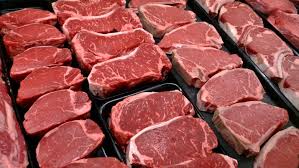Latest News
- Plane crashes near Nanaimo; police say no survivors found
- Old Toronto film equipment store ready to be sold after 40 years
- Extensive Christmas decorations in Queen's Park to attract people
- Nearly half a million Canadians left the emergency room last year before seeing a doctor; An crisis in the system
- “New law in Ontario; Should drunk drivers pay child support?
Latest Ads
-
Jasmine Jewel
Call
-
Omidan group
Call
-
Amir Madanpour
Call
-
Dimo studio
Call
-
Yorkacademy
Call
-
Maryambagheri
Call
-
Shishlix Restaurant
Call

High food prices have caused Canadians to buy less meat...
In Susana Tobar's household, meat usually takes the spotlight. The Calgary-based family, passionate about meat, often enjoys a delicious steak for dinner, and chicken makes a regular appearance on their menu as well. However, these days, their meals seem quite different. Tobar mentioned that by cutting up animal proteins into small pieces, a pasta dish can last for two or three days.
Their shopping habits at Costco have also undergone changes due to rising prices. Tobar explained, "We used to buy everything there, like chicken, shrimps, salmon, pork... five or six types of things." Now, they spend the same amount but only take home three of those protein options "because everything is so expensive now."
This pattern is echoed in kitchens and grocery lists across Canada. According to a July poll by Ipsos, 47 percent of meat eaters expressed their intention to cut back on meat consumption this year, with cost being the most common reason.
Now, food researchers suggest that after years of promoting vegetable consumption, inflation could be the catalyst for a shift towards plant-based eating.
Kathy Perrotta, Vice President of Market Strategy and Understanding at Ipsos, has been monitoring Canadian consumers' eating habits for over 20 years. Since Ipsos began asking Canadians about their intentions to reduce meat consumption in 2018, there has been a 25 percent increase in respondents planning to cut back. Interestingly, the reasons for doing so have evolved. While health and environmental concerns topped the list in 2021 and 2022, Perrotta noted that "over the past year, interestingly, the cost of meat has risen to the No. 1 position."
Perrotta suggests that these factors may signify an "inflection point" where the plant-based food movement experiences a resurgence, similar to the interest seen before the pandemic in plant-based meat alternatives such as Beyond Meat and the Impossible Burger.
Food economist Mike von Massow finds it unsurprising that people are adjusting their food habits in response to higher prices. The evolving landscape of food choices may indicate a broader reconsideration of dietary preferences driven by economic factors.
Suggested Content
Latest Blog
Login first to rate.
Express your opinion
Login first to submit a comment.
No comments yet.


































